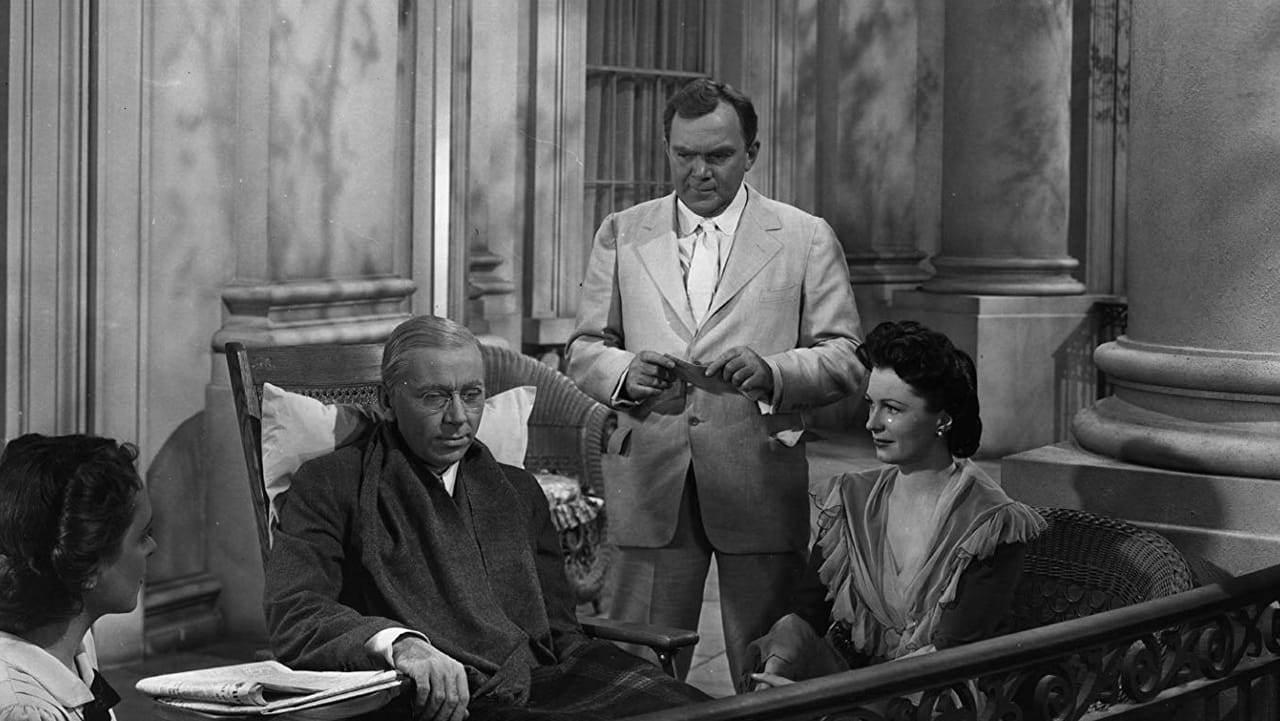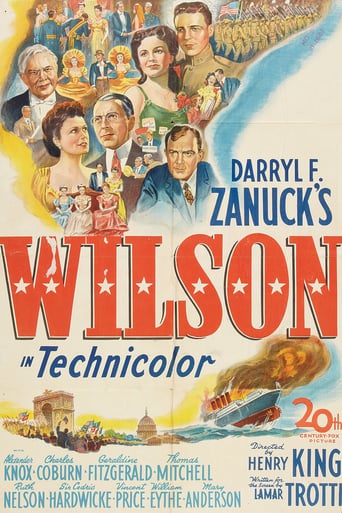wes-connors
In 1909, Princeton University professor Alexander Knox (as Woodrow Wilson) is recruited to run for Governor of New Jersey. Espousing democratic ideals and ousting establishment crooks, Mr. Knox is a great success. This puts the Governor on the political fast track and, in 1912, he is elected President of the United States. Knox' "Wilson" reluctantly steers America through the "war to end all wars" (later called World War I) against Germany and attempts to prevent future World Wars by organizing a "League of Nations" to settle international disputes. Republicans campaign against the idea. At home, the President suffers great personal tragedy when his wife is taken ill. Later, his own heath falters...One of Hollywood's notorious flops, "Wilson" was actually a hit with audiences – but, like many box office failures, the film did not make enough money to offset its considerable cost. Fox needed a blockbuster, and "Wilson" fell far short. Other expensively-made movies haven't aged well, but "Wilson" has – it's quite artful. The film won five well-deserved technical "Oscar" awards. There were nominations for producer, director Henry King and Knox. They must have wondered what else they had to do to win an "Academy Award". All three won first place "Film Daily" awards, where "Wilson" was seen more in 1945 while the stiffly competing "Going My Way" polled in 1944.******** Wilson (8/1/44) Henry King ~ Alexander Knox, Geraldine Fitzgerald, Ruth Nelson, Thomas Mitchell
Hot 888 Mama
. . . put out during a low point in U.S. public support for WWII, as Clint Eastwood's FLAG OF OUR FATHERS recently reminded us. This Bio-Pic WIL$ON found America on the verge of giving up the fight against Hitler and Hirohito due to lack of funding from a war-weary nation. Most U.S. citizens today are totally unaware that during WWII, ALL Hollywood movies had to comply with a 12-point checklist from the American War Department proving each film did enough to promote the U.S. war effort. Yes, this was on top of the 10-year-old program of "moral" censorship imposed on this self-proclaimed "free country." Yes, all this happened IN AMER!CA, even though it sounds like something that could only be dreamt up by Nazis. Therefore, WIL$ON glosses over Woodrow's life-long crusade against organized Labor and the American Common Man (hardly visible from Wilson's roots in Ivy League "ivory towers"). Of course, WIL$ON fails to point out Woodrow (campaign slogan in 1916: "He kept us out of the War") Wilson's voter back-stabbing decision to maim or kill hundreds of thousands of young American men then on the verge of making the entire country a "Union shop," with living wages, safe working conditions, and respect for normal citizens prevented us from achieving the very "peace on Earth" to which he was always giving lip service. Instead, Woodrow pushed the U.S. down the slippery slope toward the hopeless pit of Today, in which the "1 per cent" hoards 90% of Our Wealth, leaving the remaining 99% of us to scramble for the remaining 10% of Economic Crumbs. WIL$ON won five Oscars, just as German fat cats lauded director Leni Riefenstahl for her propaganda masterpiece--TRIUMPH DES WILLENS--a few years earlier.
pitcairn89
I agree with many of the comments posted here. I, too, was pleasantly surprised by this film. You always read what a box-office disaster the movie was, and you get the idea that it was a real turkey. On the contrary, I think it was a very well-made film. As many others have pointed out, it whitewashes some of Wilson's biography, and omits inconvenient truths about him, (such as some of his racial views and actions). It does point out his stubbornness in relation to the Treaty of Versailles and the League of Nations, though, and his reluctance to compromise on those things. So it isn't a total revisionist biography. It does outline the major events of his political career, and fairly accurately, I think. One thing that really strikes me on watching this film, is how well it captures the complexities of the American Presidency, and the hysteria that the public, and other politicians, often direct towards the president. I think many people, in any historical age, tend to think their generation is the first to experience certain kinds of events, such as war, depression, or political controversy. As we all know, these are timeless events, and though the particulars may change, the reactions to them don't change so much. As for politics, there are some wonderful scenes in the film of the Democratic Conventions of 1912 and 1916, that detail the serious issues, as well as the hoopla and occasional nonsense that has always marked those events. Marching bands, rural banjo players, pretty girls, etc., etc. And it also accurately details the hysterical attacks made against President Wilson- that he was weak, a waffler, a man out of his league, or a warmonger, even a traitor- comments that somehow bring to mind the outrageous things said about more recent presidents. As well as about everyone from Jefferson to Lincoln. It kind of puts it into perspective. People always say how uncivil our politics are now, which is true, but was it really different then?I'm also very impressed by Alexander Knox's performance, in which he really captures Wilson's character. Much as I love Bing Crosby, I think Knox should have won the Best Actor Oscar for that year. He is so convincing, and almost channels the President. Again, this IS a prettied-up picture of him, but I think it gets many of the essentials right. And, when compared to the paranoia in films like the Oliver Stone presidential biographies of Kennedy, Nixon, and Bush, I think this movie comes pretty close to the way it actually was. It is Movie History, but it seems to follow events fairly accurately. And it gives you a good feel about what it must have been like to be in the center of the storm. I think the film also recreates the period very well. The costumes seem accurate, the sets are realistic, the Technicolor photography is beautiful, and the contemporary music evokes the atmosphere of that time. The genuine newsreels add a lot of authenticity, too. I think the explanations for how the U.S. got into World War I are also pretty accurate, and detail what a moral struggle it was for Wilson to go to war. And, in the film, Wilson mentions the various conspiracy theories about the reasons for that war that have been in circulation since that time. Again, that reminds a person of the different conspiracy theories that swirl about our time, too.Anyway, I think this is a better film than it's given credit for. I think it is similar to the various mini-series made about Lincoln, Kennedy, and other presidents, in the TV age. It may not be complete history, but it's a good starting point for anyone interested in Wilson.Footnotes: character actor Dwight Frye, who is so beloved for his acting in "Dracula," "Frankenstein," and many other classic movies, was slated for the part of Newton D. Baker, Wilson's Secretary of War, in the film. As all Frye fans know, shortly before filming started, Frye tragically died of a heart attack, while riding on a bus. It's a shame, as the part might have turned his faltering career, and life, around.Also, in the scenes on board the train, just before Wilson has his stroke, you can see cars outside the window. It is supposed to be 1919 or 1920, but some of the cars look very contemporary- 1930s or 1940s cars. A goof, and very easy to see. But I don't think it really detracts from the movie in any serious way.

